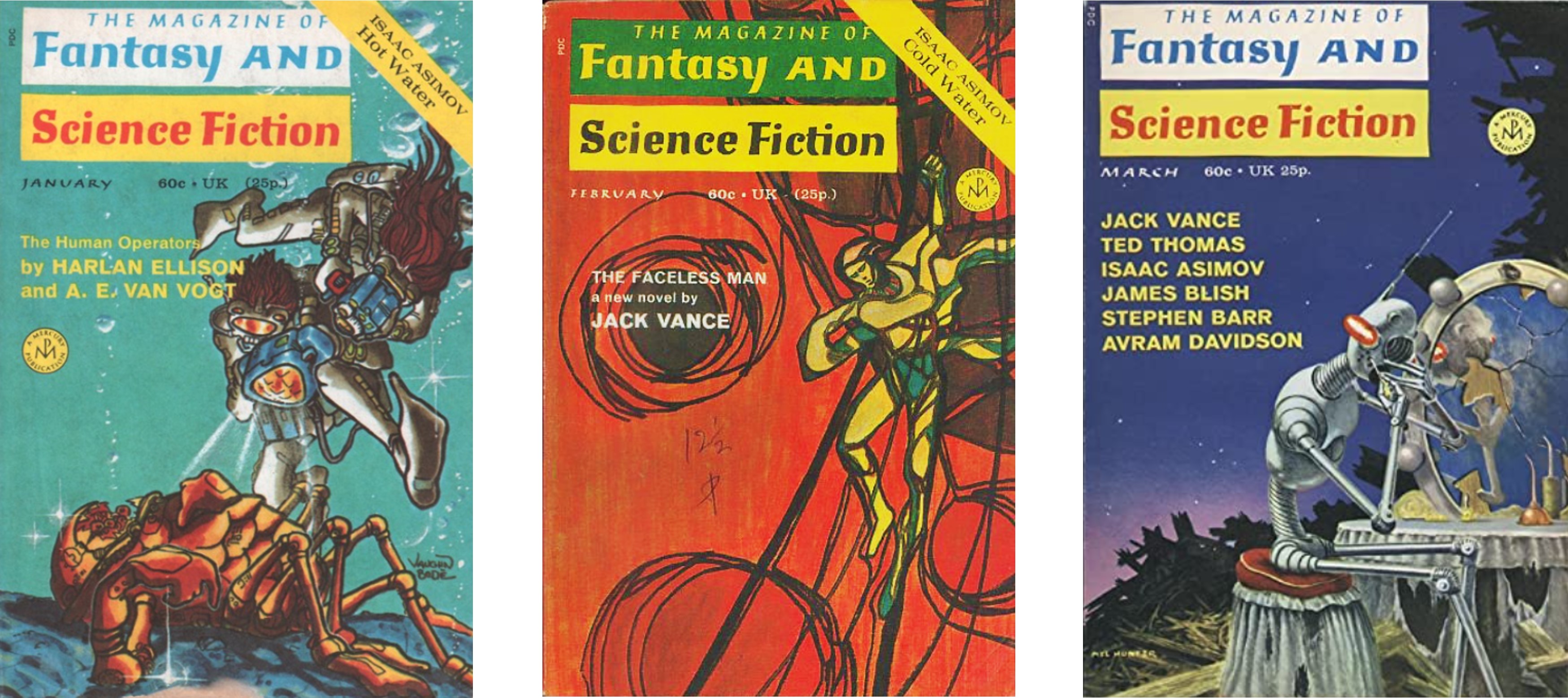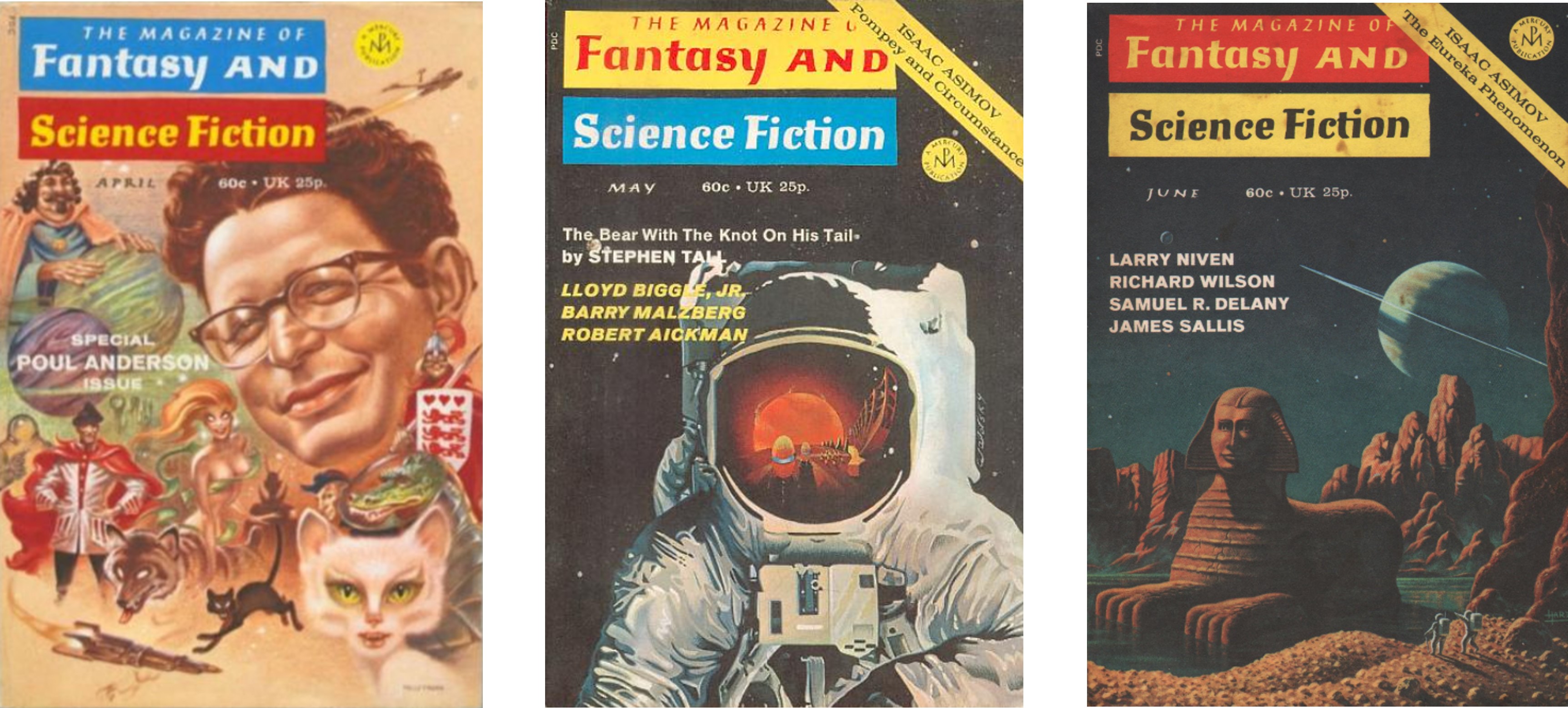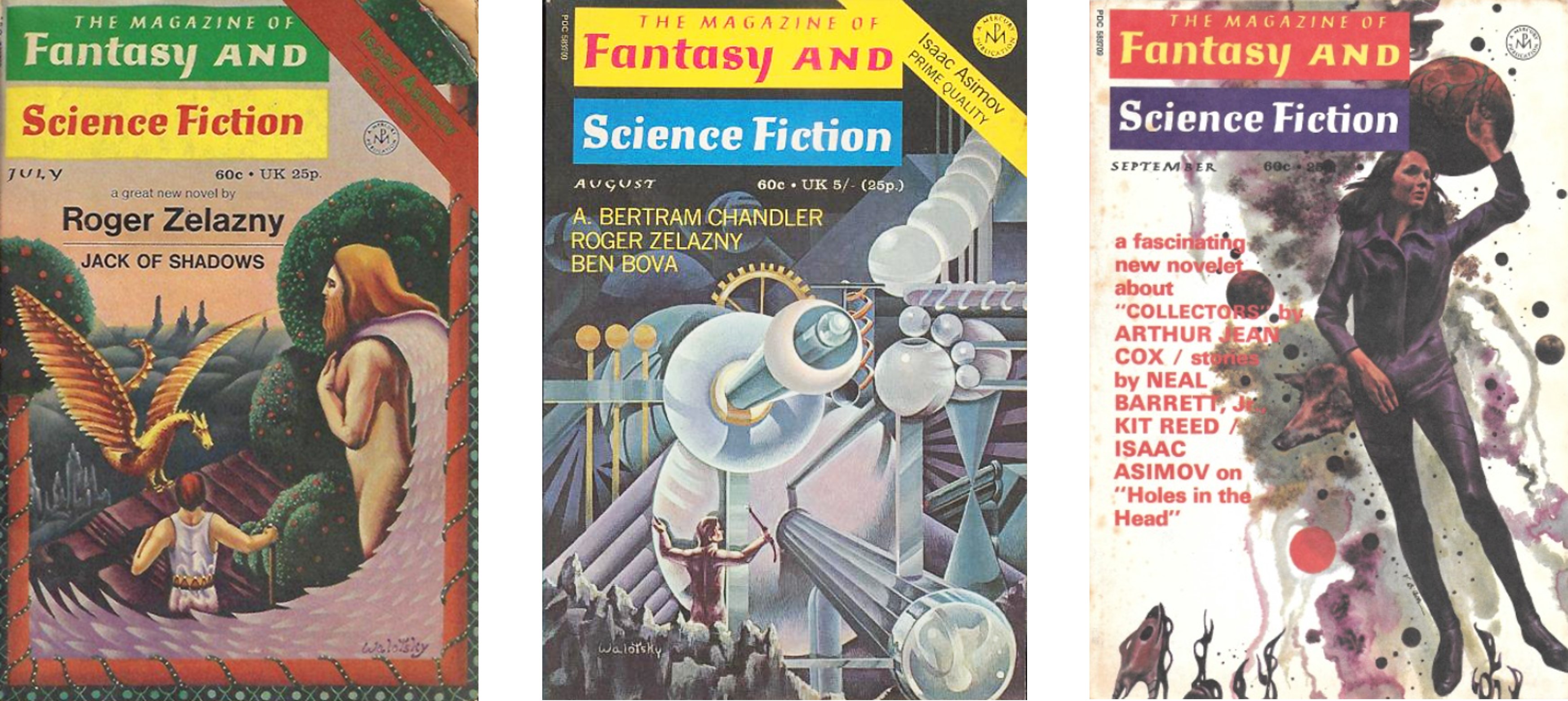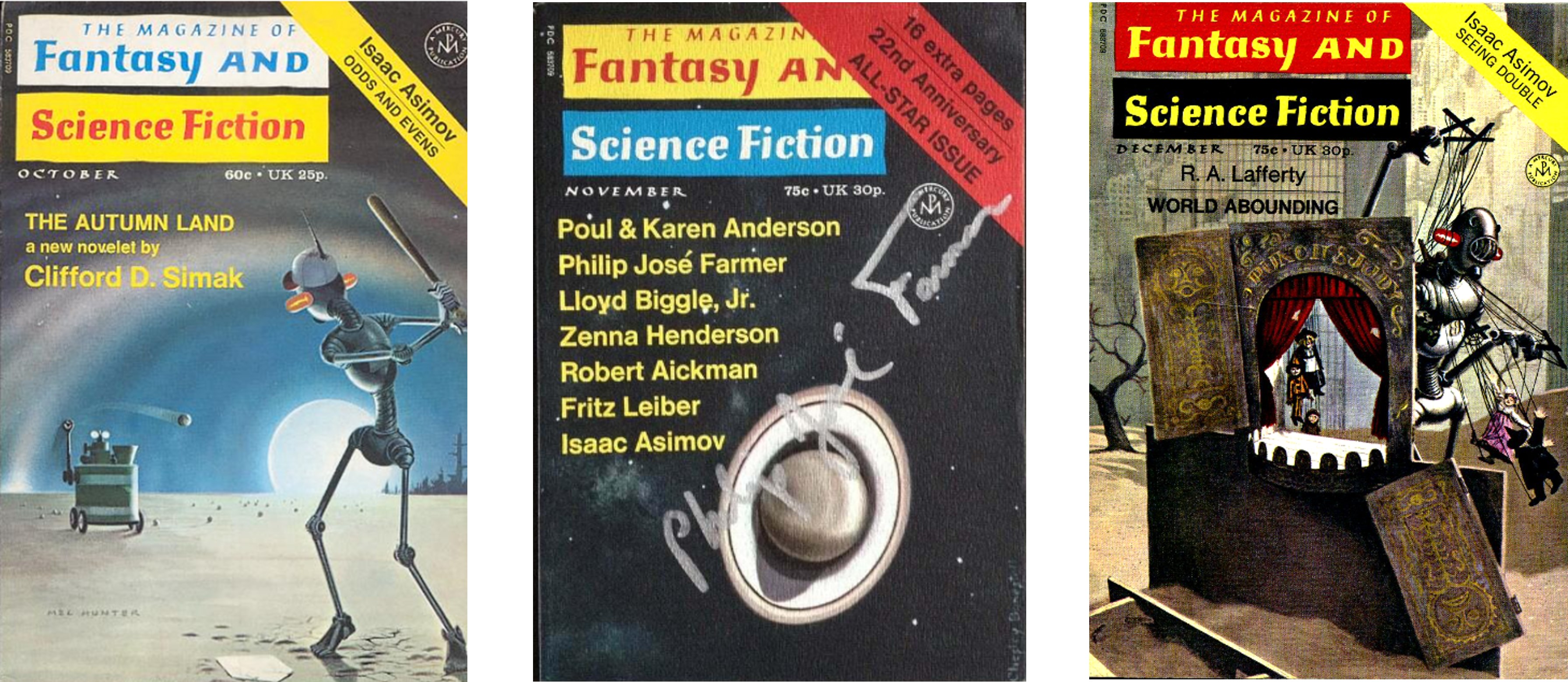



The Magazine of Fantasy & Science Fiction, 1971
The Magazine of Fantasy & Science Fiction, founded in 1949, was edited from by its co-founder Anthony Boucher from 1949-1958 and quickly gained a reputation for publishing more literary stories than the competition, and with greater diversity. in 1966, Edward Ferman became editor, a post he held for 25 years, during which time he published many notable stories and novels as serials. In 1971, the new wave of SF was in fashion, and a lot a excellent SF was being published in this era. In this feature, I am reading through each issue of the magazine from 1971, selecting a couple of stories from each issue. Isaac Asimov also provided a factual essay each issue, which usually entertain and educate - indeed Asimov contributed an article every month from 1958 until his death in 1991.

January 1971
The Human Operators - Harlan Ellison & A.E. van Vogt
This was a terrific novelette, which imagines that a fleet of starfighter spaceships gained self-awareness, killed off all but one human to maintain each ship and then subjugated the imprisoned humans in isolation and torturous conditions for generations. Only when the ships need to create the next generation of human operator do the ships meet in space to bring two humans together to procreate. It's a fantastic concept, and the mix of Ellison and van Vogt works well. The story later featured in Ellison's collection of collaborative stories, Partners in Wonder (1972).
Heathen God - George Zebrowski
This short story was nominated for the Nebula Award in 1972, losing out to Robert Silverberg's Good News from the Vatican. It is pretty good; a mission comprising a priest and a politician travel to see a gnome-like alien who eons ago made the solar system, and gave humankind sentience. The priest goes to reconcile it's god-like nature with his faith, while the politician goes to gain an electoral edge. It has the hallmarks of being a bit of a classic in its theme and Nebula nomination. One feels that if the writing were slightly edgier and challenging, it would have that status. As it is, it's simply pretty good.
February 1971
Repeat Performance - Bob Shaw
This was a terrific concept, wherein a cinema owner notices, on Wednesday showings, bit part actors from the films he's playing leaving the cinema after the reel finishes. Additionally, his projectionist complains that there are dimming brown outs during each of these movies. Given this is Bob Shaw, it's told very well, and his idea is great and would suit an Outer Limits episode well. Unfortunately, I feel he missed an opportunity for a great end.
The Beginning of April or the End of March - Thomas M. Disch
This is new wave in the best sense - it pulls and pushes at our assumptions and works up to a great ending. The writing is excellent, keeping the reader entranced while every word is made to seem strange and odd. We can't tell why it's so strange until the last line. It's impossible to summarise the story without giving too much away, but seek out this little gem.
March 1971
The Tenant - Avram Davidson
This short story by Davidson is a weird tale, more than a SF story, with rather a Lovecraftian feel. A slumlord looks to move on his tenants from some high rises he plans to demolish, but one old lady doesn't want to move. A strongarm is deputized to move her on. It's not a bad tale, and ends fairly well in a creepy way, but Davidson's writing is not the crispest prose, and it's only so-so.
Birdlime - B.L. Keller
This fantasy story by Beverly Keller is a product of its time. A sassy, sexually curious teen girl is too much for the devil to handle. If this were written by a man, it would be seen as sexist and criticised for its objectification of the girl, as it is I guess it's just slightly odd. I selected this as the second story to read from this issue as it was chosen by Ferman for a "Best of..." collection of the magazine's contents in 1973. Interestingly, all the preceding stories reviewed above are better, but none were selected for that volume. I've found this is a common occurrence - the editor of a magazine rarely seems to be the best person to select the choicest stories from their own publication. Dozois was pretty poor at it too.

April 1971(Poul Anderson Special Issue)
The Queen of Air and Darkness - Poul Anderson
I actually re-read this fairly recently, but it's a very good story - it won the 1972 Hugo award (best novella), Nebula award (best novelette) and Locus short fiction award - so I read it again. How could it be both a novelette and a novella incidentally? Anyway, it's terrific, so please hunt it down if you've not read it. This is great example of how well Anderson can combine hard SF, with an understanding and an evocation of dark ages mythology. On a little-visited colony world an ecologists young son is kidnapped by the 'Outliers' who live in the arctic circle, and she engages the world's only detective to help her get him back. This issue also contained a brief biography of Anderson, by Gordon R. Dickson, and review of his speculative fiction, by James Blish - both articles were luminating and entertaining.
Darktree, Darktide - Michael Bishop
Michael Bishop is a double Nebula award winning SF author who is still going strong. This was one of his very first SF story sales. A boy of 10 is forced to keep company with a dying old lady, described to him a distant family relative, but all is not how it seems. This is a dark fantasy tale, rather than SF, but it's well told and rather chilling.
May 1971
The Bear with the Knot on his Tail - Stephen Tall
This is a rather good space opera, in which an artistic observer of the galaxy identifies a 'knot' in the constellation of Ursa Major. Trusting to her inspiration, an exploratory team is sent out from Earth to investigate. Upon arrival, our heroes discover the star they arrive at is about to go supernova, which will wipe out the sentient civilization on an orbiting planet. Tall's tale is well written and his aliens are interestingly imagined. Part of his "stardust' short fiction series, this story placed fourth in the '72 Hugo Awards.
The Frayed String on the Stretched Forefinger of Time - Lloyd Biggle, Jr
This shares some ideas with Philip K. Dick's The Minority Report, written 15 years earlier. Biggle similarly imagines a 'pre-murder' department, wherein detectives try to prevent murders before they occur, but the twist in this case is that the predicted murder is between two business antagonists who each run suspended animation centers. It's not at all bad, and the end is quite satisfying. Carr anthologised this in the 1972 edition of his "Best Science Fiction of the Year".
June 1971
There's a Wolf in my Time Machine - Larry Niven
This is a science fantasy adventure featuring Niven's time-travelling animal collector, Svetz. Niven wrote half a dozen or so stories following Svetz's adventures, which have been collected in The Flight of the Horse (1973) and more latterly Rainbow Mars (1993). When Svetz travels to an age 1000 years preceding the 'atomic era', he encounters more than he bargained for. It's a light and humorous tale, but with some scathing satire on the modern world.
The Man Who Collected "The Shadow" - Bill Pronzini
This was a great little fantasy about a man who succeeds in collecting all the issues of The Shadow, with unexpected results. It's very well done, and nice idea. Fans of old comics and The Shadow, especially, would doubtless warm to it.

July 1971
Sweet Forest Maid - Gene Wolfe
This a short science fantasy, of a lonely young woman who packs up her dull life to go for a walk into the Klamath forest in northern California, to search for a female 'sasquatch'. It's very nicely done, and though very light on SF or fantasy, it is an engrossing little story.
For a Foggy Night - Larry Niven
Niven usually writes very well, and is always eminently readable, but this short story is a bit daft. The idea here is that when the fog rolls into San Francisco, this is represents two of the near infinite parallel universes coming back together. A mathematician meets a stranger in a bar who explains this to him. It doesn't hang together at all as SF, and fails to convince.
August 1971
A Slight Miscalculation - Ben Bova
This is an amusing tale by Bova. A mathematician at a Californian research company thinks he's discovered a mathematical prediction model for earthquakes. The response of the mathematician himself, and his co-workers is quite droll, and overall it is well done, though it is one of those comedic stories that rely on a final line twist or joke. For those who like such stories, this would go down well.
The Pied Potter - A. Bertram Chandler
Starts quite brightly, with a scientist who has created a huge, overpopulated rat cage to model the ultimate effects of over-population on humankind. However, the experiment on the rats, and the end-result seem just a touch too silly to really work, and one wonders what the point of it was by the end. So, despite being an engaging read, it's ultimately a bit disappointing.
September 1971
Fit for a Dog - Howard L. Myers
This tale starts out with some promise, in a dystopian future where humankind lives under domes, and the outside is full of packs of dogs that live off the thick smog and prey on stray humans. Unfortunately, it ends with the an outrageously homophobic twist, and would offend many.
Underground - Kit Reed
I was unfamiliar with Kit Reed prior to reading this (showing my ignorance here), but I see she wrote fifteen or so novels, and many SF&F short stories right up to her death in 2017. This was rather good. A negotiator runs away from his role in peace talks, and we catch up with him on a subway car, so loaded down with travelers that it stops deep underground. Full of allegory or metaphor, this is quite deep stuff. The crammed bodies of the subway car suggest support from sheer herd numbers, not understanding or sympathy.

October 1971
The Autumn Land - Clifford D. Simak
A few years ago I read this and was unsure how much I liked it, deciding I could be convinced it was either great or rather muddled. Upon a reread I've decided it is very good, though perhaps not great. A man travelling across country starts to see a 'thinness' in the landscape, before seeing a scene from the future of post-atomic decay. Startled by this he turns his car around to head for the town where he grew up, only to find that it is an 'autumn land' - never changing, and lost in a mythical past. The story is a clear allegory, suggesting that if we run from a future that frightens us, we'll only stand still, and that while we see the past through rose-tinted glasses, it is ultimately unreal. It's quite a compelling science fantasy, written well, and is very 'Simakian'.
The Smell of Death - Dennis Etchison
This starts with a lot of promise, but it ultimately takes us a little less far and to less interesting places than one might have hoped. The protagonist - who owns a service station and coffee house in the middle of nowhere - is an ex-astronaut who can smell death. He 'helps' folk who come through on the highway, but is riddled with guilt for his past actions. It's well done, with a good sense of psychological depth to it. I'm not that familiar with Etchison, as I read very little horror (which is his métier), but he's well regarded in that genre, with Stephen King calling him "one hell of a fiction writer" and Karl Edward Wagner proclaimed him "the finest writer of psychological horror this genre has ever produced."
November 1971
Only Who Can Make a Tree - Philip José Farmer
I don't come across many Farmer short stories (not once did he publish in Astounding/Analog, for instance) so I was interested to read this, given how much I've appreciated his novels. However, it is dreadful, so don't make my mistake and pick it up. Supposedly a ribald comedy, it is neither funny, nor engaging, but seems to have been written simply to annoy the reader. This was perhaps very 'new wave', but it hasn't aged well. I couldn't even really tell you what it was about, as I had to struggle though it in a daze and just flicked through the last few pages.
The Price of Pain Ease - Fritz Leiber
This is one of Leiber's Fafhrd and the Gray Mouser stories. These chronicle the long-running adventures of the titular 'sword and sorcery' heroes in tales Lieber wrote between 1939 and 1988. This particular story is collected in the second volume of the series, Swords and Death. While these stories are very popular, this didn't work for me, especially. Unless fantasy is overtly written as comedy (such as in Discworld or Xanth), it needs to take itself seriously so the reader can immerse himself in the fantasy world. Sly winks to the reader (in the use of place names for instance) unhinges the world-building and lets the story down. Here we have the 'City of Ghouls', the 'Sea of Monsters' and the 'Parched Mountains' all referenced in one sentence, making the world seem like a parody. With too much going on that's just plain silly (without being comedy), and a title that's grammatically sinful, this failed for me.
December 1971
World Abounding - R. A. Lafferty
It's been said before (by me among others), but no-one writes like Lafferty. It's important to go into a Lafferty story with your mind on an even keel, as his writing will tilt it by about 30 degrees, and one doesn't want to topple over. This novelette is no exception in its surreal and unique style and ideas. Indeed, I'm yet to read an exception by the author. A planetary exploration team travel to a planet called 'World Abounding', where every exploratory trip in the past has resulted in the visitors returning with the words 'You'll never believe it", and saying nothing else. It transpires the planet is a Gaia world, which induces pregnancy (with a 5 day gestation period) and rapid development of the resulting offspring. Further weirdness eventuates, as one might expect. I wish I understood everything Lafferty meant by his tales, but they always remain to some extent opaque. One can say that here he explores the value of experience, and the necessity of an ambition to experience more, in providing value to our lives.
Causation - Barry N. Malzberg
Is very short, rather bleak, and not very good. An individual discusses with 'Network' the need to be more explicit in showing sex on TV, to assist the sexually-repressed during wartime. Or something like that. It's message is muddled, it goes out of its way to avoid clarity, and Malzberg throws in the odd homophobic and misogynistic jibe just to keep us on our toes. Avoid. It's a shame the read-through ended on a low, but not to worry; my rule of picking two stories per issue more or less randomly will throw up some forgotten gems, and some other tales best left forgotten; but the not knowing going in is part of the fun.
------------------------
Overall F&SF 1971 was great fun to read through, with some stellar stories to discover. Some stories were dreadful, representing some of the least appealing features of the era's 'new wave' as well as homophobic and misogynistic traits, but these were in the minority. It probably did confirm for me that I'm more of an Astounding/Analog man than I am a F&SF fan, however.